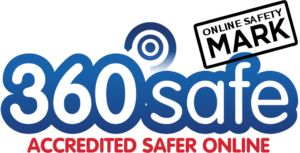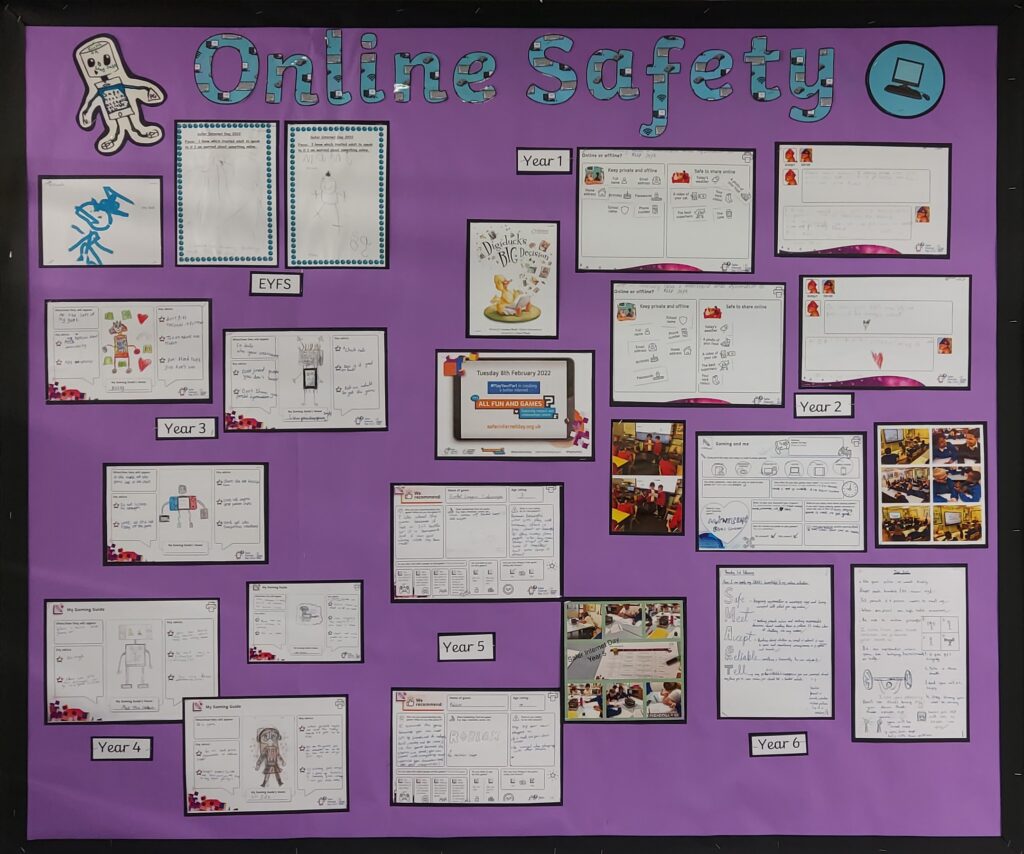Information
Online Safety and Digital safeguarding
With technology usage even more prevalent at this time, online safety is a vital part of children’s life and education in today’s ever-growing digital world and is rooted in their computing curriculum at our school.
As a school, we feel that engaging and supporting parents and children improve their own understanding of online safety issues is of great importance, so they can learn to use and support each other when using the internet and all digital media, in a safe and secure way.

At School:
As part of the wider curriculum, access to the internet is given to the children in teacher supervised lessons and is strictly monitored by Senior Leadership.
We strongly believe that the use of the Internet and online communication is hugely worthwhile and an essential learning tool for our pupils as they grow up in the modern world. But because there are always concerns about children having access to undesirable materials, we have taken positive steps to deal with this risk in school. Our school internet access provider operates the Smoothwall filtering system that restricts access to inappropriate materials. Children are also educated through the Computing curriculum on how to report any inappropriate material. All children in school are encouraged to apply their learning into their everyday lives.
As part of promoting online safety in school, during the Spring term, all year groups complete a full unit of online safety learning including Health and relationships education. every year in February, we take part in “safer internet day”, which all children are involved in and we also invite parents/carers to join us with this too. Look at the safer internet day link in resources for more information on this. Safer Internet Day is designed to empower young people to take control of their digital lives.

We have also been lucky enough to gain the 360 degree online safety award in July 2022. This accreditation recognises our school was able to show good practice in our Online Safety policy and procedures. The assessor met with a range of staff, students/pupils, parents/carers and governors and carried out a brief review of some of the school’s paper/online evidence (policies, minutes, audit logs etc). At the end of the visit the school/academy will be informed that we had been successful. The assessor also suggested areas of strength and weakness in the school’s/academy’s online safety provision.

At the start of the school year, we send home An Acceptable Usage policy to parent/carers for them to sign and agree to. We also ask every child in KS2 to sign an Acceptable Use Agreement policy (AUP) so that we know they have read and understood our school’s rules on staying safe when using devices and the internet and KS1 to sign an adapted version for our younger children.
Copies of this policy can be accessed below:
Acceptable Use of ICT Policy feb 25
Any breaches of this policy or online safety concerns are taken extremely seriously, and steps are taken to prevent further occurrences – for more information on this, please read our online safety policy that can be found on our policies page.

At Home:
It is clearly evident how important the internet is to children at home – they use it to learn, play, socialise and express themselves. It’s a highly creative place of amazing opportunities and an excellent learning tool. However, the technology children use every day can seem complicated at times and you may worry about the risks your child can face online – such as cyber-bullying, contact from strangers,spam and phishing and the possibility of them seeing or hearing illegal or inappropriate content.
Creating a comfortable environment and creating a place for dialogue to discuss any of these issues is a great starting point, a child knowing they can approach you about these issues is more likely to speak out about them. To support you with this here are a few things you can do:
- Ask your children to tell you about the sites they like to visit and what they enjoy doing online.
- Ask them about how they stay safe online? What tips do they have for you, and where did they learn them? What is OK and not OK to share?
- Ask them if they know where to go for help, where to find the safety advice, privacy settings and how to report or block on the devices and apps/games that they use.
- Encourage them to help. Perhaps they can show you how to do something better online or they might have a friend who would benefit from their help and support.
- Think about how you use the internet as a family. What could you do to get more out of the internet together and further enjoy your lives online?
For further help, Here are some conversation starter ideas from www.childnet.com
Parent Resources:
To try and help parents with the fast moving and changing world of internet and social media, we’ve suggested a few internet resource sites, with excellent resources that contain information on different types of social media and how to help keep children safe.
Childnet also produce a leaflet for parents which can be downloaded here.
Internet Safety Resources:
There is a great new online safety tool designed for parents launched by the Department for Education called Parent Info. It has advice on everything from keeping children safe from online bullying to WhatsApp – a guide for parents.
Smartphone Safe
If you would like more information on how to keep your child safe when they are using a mobile device, Smartphone safe is a great online tool for this.

Childnet is a great website resource for parents and children on online safety.
Internet Matters is another great site to use – it has advice on cyberbullying, how to talk to your children about internet safety and easy guides to different types of social media such as Instagram and Snapchat. You can visit their page below.
Here are links to some very helpful websites that may answer any queries or support:
CEOP Police
DofE advice for parents on cyberbullying here
DofE online parents support website called Parent Info here


